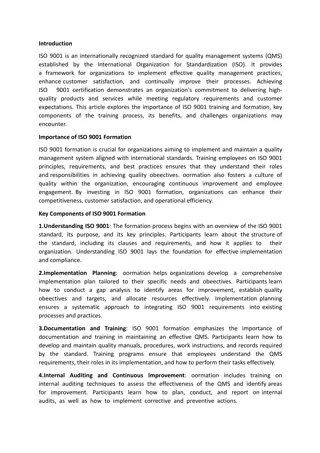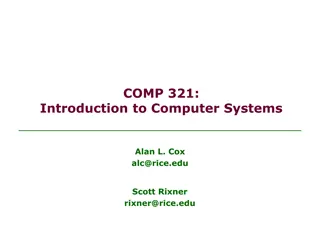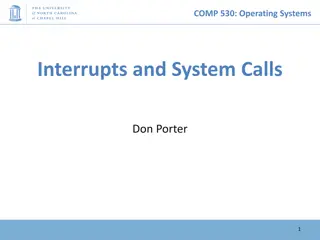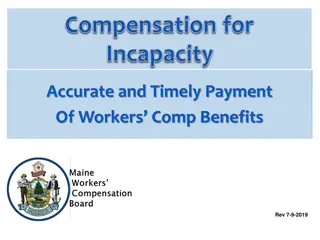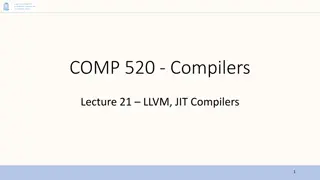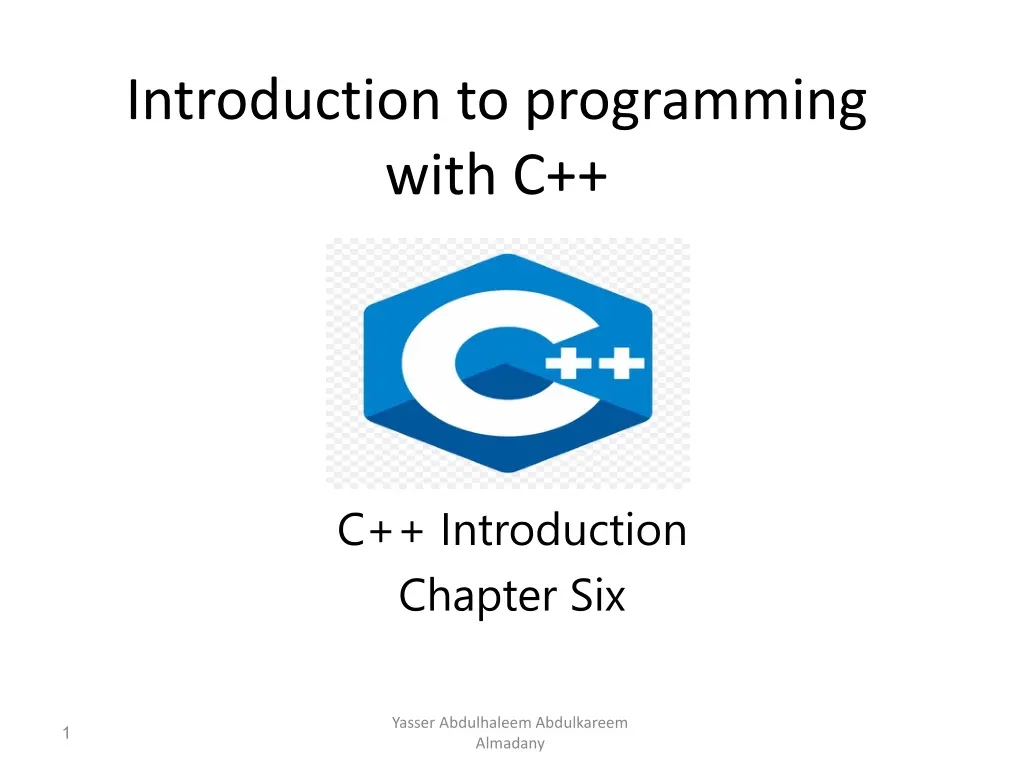
Introduction to C++ Conditions and If Statements
Learn how C++ supports logical conditions such as less than, greater than, equal to, and more. Explore the usage of if, else, else if, and switch statements to control program flow based on different conditions in C++ programming. Practice writing code snippets to understand how to implement conditional statements in C++ efficiently.
Download Presentation

Please find below an Image/Link to download the presentation.
The content on the website is provided AS IS for your information and personal use only. It may not be sold, licensed, or shared on other websites without obtaining consent from the author. If you encounter any issues during the download, it is possible that the publisher has removed the file from their server.
You are allowed to download the files provided on this website for personal or commercial use, subject to the condition that they are used lawfully. All files are the property of their respective owners.
The content on the website is provided AS IS for your information and personal use only. It may not be sold, licensed, or shared on other websites without obtaining consent from the author.
E N D
Presentation Transcript
Introduction to programming with C++ C++ Introduction Chapter Six Yasser Abdulhaleem Abdulkareem Almadany 1
C++ Conditions and If Statements C++ supports the usual logical conditions from mathematics: o Less than: a < b o Less than or equal to: a <= b o Greater than: a > b o Greater than or equal to: a >= b o Equal to a == b o Not Equal to: a != b You can use these conditions to perform different actions for different decisions. Yasser Abdulhaleem Abdulkareem Almadany 2
C++ Conditions and If Statements(cont'd.) C++ has the following conditional statements: o Use if to specify a block of code to be executed, if a specified condition is true. o Use else to specify a block of code to be executed, if the same condition is false. o Use else if to specify a new condition to test, if the first condition is false. o Use switch to specify many alternative blocks of code to be executed. Yasser Abdulhaleem Abdulkareem Almadany 3
The if Statement Use the if statement to specify a block of C++ code to be executed if a condition is true. Syntax: if (condition ) { // block of code to be executed if the condition is true } If boolean expression evaluates to false, then the first set of code after the end of the if statement (after the closing curly brace) will be executed. Note that if is in lowercase letters. Uppercase letters (If or IF) will generate an error. Yasser Abdulhaleem Abdulkareem Almadany 4
The if Statement(cont'd.) In the example below, we test two values to find out if 20 is greater than 18. If the condition is true, print some text: #include <iostream> using namespace std; int main() { if (20 > 18) { cout << "20 is greater than 18"; } return 0; } Yasser Abdulhaleem Abdulkareem Almadany 5
The if Statement(cont'd.) We can also test variables: Example: #include <iostream> using namespace std; int main() { int x = 20; int y = 18; if (x > y) { cout << "x is greater than y"; } return 0; } Yasser Abdulhaleem Abdulkareem Almadany 6
The if Statement(cont'd.) Example explained: In the example above we use two variables, x and y, to test whether x is greater than y (using the > operator). As x is 20, and y is 18, and we know that 20 is greater than 18, we print to the screen that "x is greater than y". Exercise: Print "Hello World" if x is greater than y. Yasser Abdulhaleem Abdulkareem Almadany 7
The if Statement(cont'd.) #include <iostream> using namespace std; int main() { int x = 50; int y = 10; if(x>y) { cout << "Hello World"; } return 0; } Yasser Abdulhaleem Abdulkareem Almadany 8
C++ else Statement Use the else statement to specify a block of code to be executed if the condition is false. Syntax: if (condition) { // block of code to be executed if the condition is true } else { // block of code to be executed if the condition is false } Yasser Abdulhaleem Abdulkareem Almadany 9
C++ else Statement(cont'd.) Example: #include <iostream> using namespace std; int main() { int time = 20; if (time < 18) { cout << "Good day."; } else { cout << "Good evening."; } return 0; } Yasser Abdulhaleem Abdulkareem Almadany 10
C++ else Statement(cont'd.) Example explained. In the example above, time (20) is greater than 18, so the condition is false. Because of this, we move on to the else condition and print to the screen "Good evening". If the time was less than 18, the program would print "Good day". Yasser Abdulhaleem Abdulkareem Almadany 11
C++ else if Statement Use the else if statement to specify a new condition if the first condition is false. Syntax: if (condition1) { // block of code to be executed if condition1 is true } else if (condition2) { // block of code to be executed if the condition1 is false and condition2 is true } else { // block of code to be executed if the condition1 is false and condition2 is false } Yasser Abdulhaleem Abdulkareem Almadany 12
C++ else if Statement(cont'd.) Example: #include <iostream> using namespace std; int main() { int time = 22; if (time < 10) { cout << "Good morning."; } else if (time < 20) { cout << "Good day."; } else { cout << "Good evening."; } return 0; } Yasser Abdulhaleem Abdulkareem Almadany 13
C++ else if Statement(cont'd.) Example explained In the example above, time (22) is greater than 10, so the first condition is false. The next condition, in the else if statement, is also false, so we move on to the else condition since condition1 and condition2 is both false - and print to the screen "Good evening". However, if the time was 14, our program would print "Good day." Yasser Abdulhaleem Abdulkareem Almadany 14
C++ Switch Statements Use the switch statement to select one of many code blocks to be executed. Syntax: switch(expression) { case x: // code block break; case y: // code block break; default: // code block } Yasser Abdulhaleem Abdulkareem Almadany 15
C++ Switch Statements(cont'd.) This is how it works: The switch expression is evaluated once. The value of the expression is compared with the values of each case. If there is a match, the associated block of code is executed. The break and default keywords are optional, and will be described later in this chapter. Yasser Abdulhaleem Abdulkareem Almadany 16
C++ Switch Statements(cont'd.) The example below uses the weekday number to calculate the weekday name: #include <iostream> using namespace std; int main() { int day = 4; switch (day) { case 1: cout << "Monday"; break; case 2: cout << "Tuesday"; break; Yasser Abdulhaleem Abdulkareem Almadany 17
C++ Switch Statements(cont'd.) case 3: cout << "Wednesday"; break; case 4: cout << "Thursday"; break; case 5: cout << "Friday"; break; case 6: cout << "Saturday"; break; case 7: cout << "Sunday"; break; } return 0; } Yasser Abdulhaleem Abdulkareem Almadany 18
The break Keyword When C++ reaches a break keyword, it breaks out of the switch block. This will stop the execution of more code and case testing inside the block. When a match is found, and the job is done, it's time for a break. There is no need for more testing. A break can save a lot of execution time because it "ignores" the execution of all the rest of the code in the switch block. Yasser Abdulhaleem Abdulkareem Almadany 19
The default Keyword The default keyword specifies some code to run if there is no case match: Note: The default keyword must be used as the last statement in the switch, and it does not need a break. Example: #include <iostream> using namespace std; int main() { int day = 4; Yasser Abdulhaleem Abdulkareem Almadany 20
The default Keyword(cont'd.) switch (day) { case 6: cout << "Today is Saturday"; break; case 7: cout << "Today is Sunday"; break; default: cout << "Looking forward to the Weekend"; } return 0; } Yasser Abdulhaleem Abdulkareem Almadany 21




